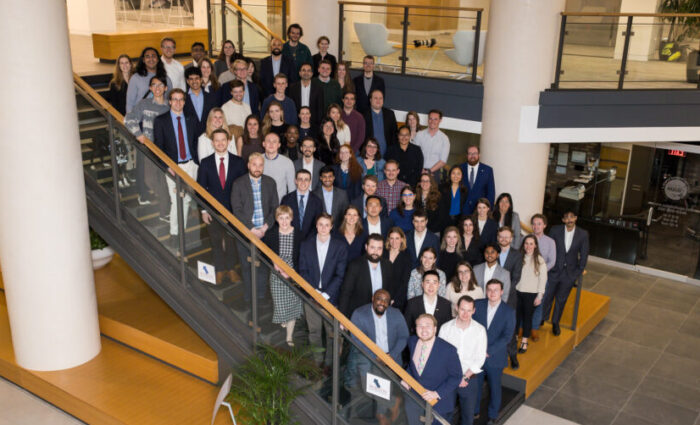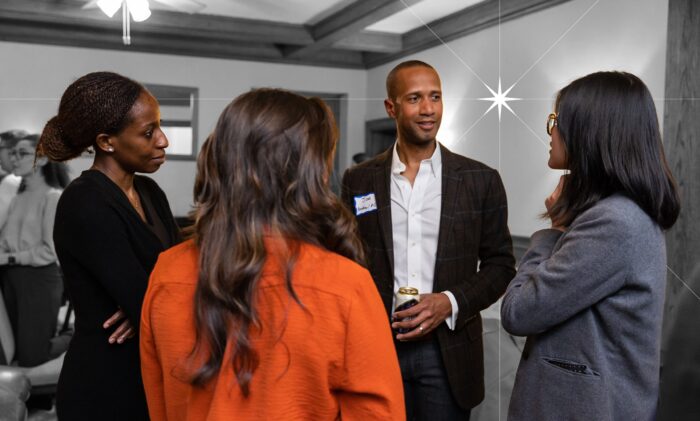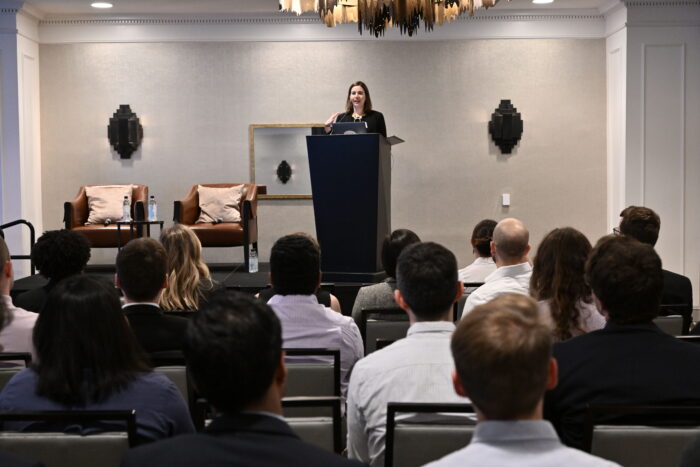Fellow Q&A: Katarina Watney
This is part of our fellow Q&A series to give prospective applicants and other interested audiences a glimpse at what it’s like to be a Horizon Fellow.

Before becoming a Horizon Fellow, you worked at a variety of organizations focused on health policy. What were those experiences like, and what did you learn from them?
Before Horizon, I worked at CRDF Global, a government contractor, where I focused on international cooperative threat reduction. My research included questions like: how does the US cooperatively engage with other countries to increase our biosafety and biosecurity measures? How can we increase sanctions compliance to make sure bad actors aren’t getting access to materials or money to further nefarious plans? While working there, I learned some of the more operational components of government work. How do you interact with senior government officials as a client? How do you anticipate their needs and try to serve them? I learned a lot about government contracting and proposal writing.
I also worked at a health policy consulting firm, where I learned more about how to craft and propose policies, and once there is a policy change, how to interpret that change and how that change impacts different stakeholders. I worked on measuring and evaluating policies by setting up studies to figure out whether or not something is saving money and improving outcomes. One specific example is analyzing the use of Medicaid as a bundled payment model instead of a fee model. I faced questions like, how do we determine whether this maintains or improves outcomes while saving money? It’s very hard to set up a randomized controlled trial, so how should we collect relevant data? And how should we anticipate what different stakeholders might think? That’s the sort of policy mindset that the work helped me develop.
What inspired you to apply for the Horizon Fellowship?
I had always been interested in infectious diseases, bioterrorism, and biosecurity. The US government is one of the largest funders of that space, and recently, there has been a lot of opportunity to work on both national and international pandemic preparedness and biosecurity. So for someone who’s interested in that kind of work, Horizon feels like the place to be to make an impact. It can be quite hard to get hired in government, especially as a relatively early career professional. The process is pretty opaque and bureaucratic, and there are often very specific experience requirements. I was excited that the Horizon Fellowship offers an opportunity to learn more about the kinds of roles that I would be qualified for and eager to fill in government. I also knew that going through the Horizon training program would help me become more competitive for those roles.
Could you say a bit more on what you learned during the Horizon training program, and how it helped prepare you for your role at the Department of Health and Human Services (HHS)?
I think it is really helpful to get in “reps” for certain tasks that are common in policy roles. The more you do a given task, the better you get. For instance, I learned about how to write a very concise memo for a decision-maker that has only one minute to read about an issue. How do you make the information relevant to them, and how exactly should you craft your email? I learned about making my policy writing more concise and I learned a lot about public speaking. It was also helpful to have to pitch policy ideas to my peers and get grilled about the pitch’s content. I felt as well that the general professional development advice I got from people already working in policy was very helpful. But what stayed with me most was getting more reps in!
What is your main focus now that you are at HHS?
I work under the Department of Health and Human Services in the Administration for Strategic Preparedness and Response (ASPR). ASPR is responsible for all things preparedness, including pandemics and natural disasters like hurricanes. During my first year of placement, I worked at the HHS Coordination Operations and Response Element, also known as H-CORE. There, I focused on the response element to events, especially the operations and logistics for medical countermeasure distribution. I got to work on their planning team, where there was a big focus on execution. Once the government makes a decision, how exactly do you act on it? How do you document the trade-offs of each action and ultimately decide how you’re going to move forward? A main project I worked on was sending COVID-19 test kits to American homes. I also worked on storing products in warehouses and moving out expired products.
I just started my second year placement, serving as deputy chief of staff in the Office of Preparedness. The work is quite different: I’m learning a lot about what it looks like to run an office in a government agency. I have a lot of broad exposure to all the sub-offices within my office, and I get to see how our office leadership makes decisions and translates guidance from the senior level down to the office level. I’m learning a lot about office processes, like hiring a team and managing a budget. I think a lot of these skills are important for a long-run career in the preparedness and response space.
What have you been thinking about lately with respect to health policy? And has anything surprised you about working on health policy in your move from consulting to government?
One important lesson from the inside is that everything is extremely complicated. I think from the outside, it can sometimes appear that there’s a simple, easy answer to a health problem, right? Like, just increase the funding, or change the contracting mechanism, or just use this new procedure. But every teeny tiny issue has hundreds of stakeholders behind it, who all want very different things and have different goals, and behind that, there are political appointees and leaders who are on the line to justify their decision, often with different pressures coming from their leadership. Even small things like keeping a program running can be incredibly complicated and expensive. So something that’s been surprising and that I’ve been thinking about is the number of trade-offs here. It’s quite hard!
How have you stayed in touch with your cohort of Horizon Fellows during your fellowship? What support have you received?
I’m really grateful for the cohort. They’re really great, and I feel like we’ve got opportunities to meet up socially and have fun together. It feels like we’re all working on very different things, so it’s fun to hear about what everyone else is thinking about and to learn things that are outside of my specific wheelhouse. It’s nice to share both frustrations and wins. It can be comforting to know that other people have also poured their heart and soul into a project, only for that priority to just shift out of nowhere, and then it’s gone. It’s also interesting to hear different perspectives. I’m in an agency where we are executing work that is determined by Congress, so listening to the Congressional fellows think about policy requirements for different legislation is very illuminating.
What advice would you give to someone who is applying for the Horizon Fellowship?
My advice is that you should absolutely apply. Horizon is interested in people with a lot of different backgrounds and interests. Anyone with any background, even if it’s not one that typically leads to a policy role, has this great and relatively low-risk opportunity to just try it out. See if it’s a good fit!
I think I would also advise people to think creatively about their comparative advantage, because there are a lot of people in my agency that have different workforce backgrounds. The government really benefits from a diverse array of people with on-the-ground experience. Nurses and pharmacists can help with private sector pharmaceutical distribution and cold chain. PhD scientists have a huge role to play. Communications experts as well. So even if the government doesn’t seem like a natural next step, you should really consider it.



